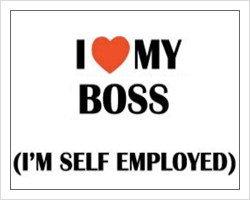Those of you that run a business as a sole trader or as part of a partnership probably don’t have too much spare time to rub together. Making sure that your self employed accounts are up to date might use up what is left. At Big Red Cloud we try to help out those with self employed accounts to prepare as much as possible. So here are 5 steps to getting your self-assessment obligations done and dusted.
1. Register for self-assessment
If you’re running a sole trader or a partnership you will need to register with HMRC before you can send them your tax return. As the tax year ends in April the deadline for registering is generally early October and can be found on the HMRC website.
Registering for self-assessment means that HMRC will be able to accept your records rather than holding you to standards designed for incorporated organisations.
2. Separate bank accounts
This is one of the most basic but equally, important business tips anyone can give you. We’ve mentioned it a few times before but it’s worth repeating again here. If you’re self-employed and you don’t have a dedicated bank account for your business, it needs to be top of your to do list.
Balancing your personal affairs and business deals through one account is reckless enough, never mind trying to prepare your self employed accounts by sifting through transactions that aren’t related to them.
It all becomes even more complicated if your business is liable to pay VAT. If this is the case the best thing to do is to have a bank account dedicated to VAT where you can set aside the funds that you will owe to HMRC.
Either way, make sure you have a dedicated business bank account. It will make keeping on top of your self employed accounts easier as well as putting your business itself in a healthier state of affairs.
3. Keep Your Records
It’s no secret, the more organised you are, the easier your self employed accounts are going to be. You are required to keep records of: sales and income, business expenses, VAT records (if required) PAYE records (if you employ people) and personal income.
Keep the records from each transaction such as receipts, invoices, bank statements so that you have them when it comes time to sit down and prepare your self-employed accounts. Set some time aside every week or month to keep your books up to date. The last thing you want to happen is to have your accounts interfere with your customer service around deadline time.
4. Partnerships
Are you part of a partnership rather than a sole trader? If you are you will still be required to submit your own self-assessment tax return. A nominated partner in each partnership is responsible for the business’ records and tax returns in addition to their self employed accounts.
5. Pay your obligations
Once you are happy that your records are in order, go ahead and submit them. All that’s left then is to pay the tax obligations that arise from your self employed accounts. Generally, three obligations will arise;
- Self-assessment tax bill
- Class 2 National Insurance bill
- Vat bill
You will make Class 2 National Insurance payments to qualify for benefits such as the state pension. If you’re business is required to pay vat you’ll have to make sure you do so by the deadline.
Once you’re finished, you can get back to spending that time on your business or your personal life.
–
Big Red Cloud
For business owners that want to reduce the time spent managing their accounts, Big Red Cloud provides online accounting software that is simple to setup and easy to use so you can spend more time running your business.
We’ve been making accounting easier for over 20 years, so why not take a Free Trial




